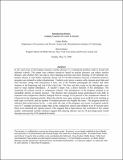Abdul Latif Jameel Poverty Action Lab (J-PAL)
The Abdul Latif Jameel Poverty Action Lab (J-PAL) serves as a focal point for development and poverty research based on randomized trials . The objective is to improve the effectiveness of poverty programs by providing policy makers with clear scientific results that help shape successful policies to combat poverty. J-PAL works with NGOs, international organizations, and others to evaluate programs and disseminate the results of high quality research. We work on issues as diverse as boosting girls' attendance at school, improving the output of farmers in sub-Saharan Africa, racial bias in employment in the US, and the role of women political leaders in India.
J-PAL was started in June 2003 by Professors Abhijit Banerjee, Esther Duflo, and Sendhil Mullainathan at the Massachusetts Institute of Technology. J-PAL was renamed in honor of Abdul Latif Jameel in October 2005.
Collections in this community
Recent Submissions
-
Women as Policy Makers: Evidence from a Randomized Policy Experiment in India
(2007-10-05)This data set uses political reservations for women in India to study the impact of women's leadership on policy decisions. Using a dataset we collected on 265 village councils in West Bengal and Rajasthan, we compare the ... -
Udaipur Health Study
(2007-10-05)This data set contains data on the health histories of, and access to healthcare facilities for, individuals located in the Udaipur districts of Rajasthan, India. Data was collected at the household level, as well as at ... -
Monitoring Works: Getting Teachers to Come to School
(2007-10-05)This data was collected from a randomized experiment run by Seva Mandir and J-PAL in the tribal villages of Udaipur, India. An incentives program was implemented to reduce high teacher absence in non-formal primary education ...


